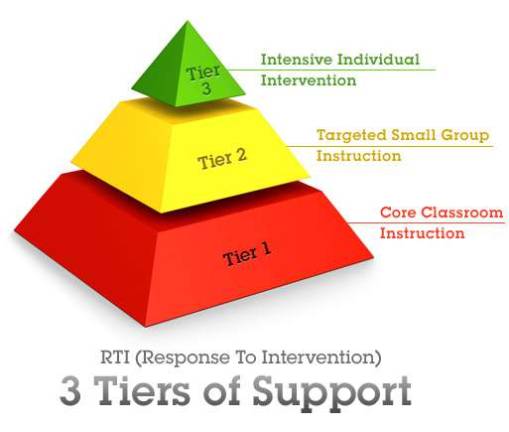High Point leads the way

SUSSEX — The New Jersey Department of Education announced on Sept. 13 a new program called the New Jersey Tiered System of Supports, designed to promote the identification and support of students with academic or social difficulties, after recognizing its success in state district schools (like High Point).
High Point Regional High School has implemented the same program for the past four years, modeled on a research-based program called RTI—Response to Intervention, which is a multi-tiered approach to aid struggling learners by monitoring progress.
At Tier I, classroom teachers consult with educators in other subjects in order to provide individualized instruction. A Tier II intervention might include inserting a Reading Specialist into a particular class or providing summer enrichment lessons for students that would benefit prior to advancing to higher-level courses. At Tier III, individual students receive a personalized action plan specific to his/her needs.
Superintendent Scott Ripley started the RTI program at High Point three years ago to increase graduation rate, which has since risen from 87 percent to 95 percent.
“We needed a proven system for identifying and supporting students who were at-risk,” Ripley said. “Rather than work in isolation, RTI requires our support services to be synergized and for our interventions to constantly be measured and retooled. Our staff is ‘all in’ when it comes to ensuring that every student is successful.”
The school started with reassigning Edward Blevins as the new full-time Behaviorist and Carla Mancuso as the new full-time Reading Specialist. Blevins provides counseling and individualized support to students experiencing emotional or behavior difficulties and Mancuso screens and provides classroom support to all freshman to learn which students are reading below the appropriate grade level.
Tier III action plans are implemented by the faculty Intervention and Referral Services Committee (I&RS), headed by language arts instructor Patricia Piatt. The committee meets weekly to review student cases.
“In addition to tutoring, teachers lend a supportive ear, cheer on student progress, and communicate with families,” Piatt said.
According to Piatt, greater than 20 teachers and support staff (nurses, guidance counselors, etc.) volunteer to develop action plans and oversee intervention plans.
“[Piatt] has been an amazing asset,” Director of Curriculum and Instruction Seamus Campbell said. “Her mindset of tailoring our resources to what works for students is the backbone of our RTI program. She believes in our students.”
“The key to RTI is relationships," he said. "Our efforts have been effective because our staff works together and because our students know how much we care about their success.”
According to the I&RS Committee, research shows that students with academic difficulties tend to fall further behind their peers over the summer. For this reason, mathematics RTI specialist Kirstin Sabo helped develop a credit recovery program for 9th and 10th grade students that failed their math classes.
STEM Supervisor Brian Drelick praises Sabo for her dedication, observing how she has offered her services during the weekdays, evenings and weekends.
“[Sabo’s] instinct to develop personalized supports and never give up on a student provides the key to her success in these endeavors,” Drelick said.
Additionally, High Point provides daily lunch tutoring and administers discipline in accordance with a revised approach called Positive Behavioral Interventions & Supports (PBIS).
“When students misbehave, it is often an opportunity for growth,” Principal Jonathan Tallamy said. “Our primary goal is not to punish but rather to teach and correct misbehavior.”